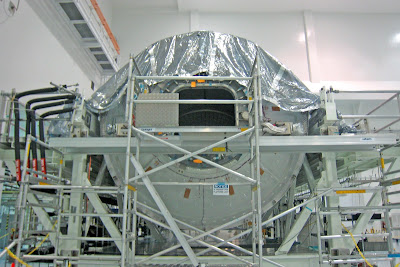Jupiter is the largest planet in our solar system and the planet most responsible for our current planetary orbits and orders. I once coded a model of our solar system that included and then removed Jupiter, and what a difference! Jupiter keeps everyone in line. My favorite feature of Jupiter is its colorful cloudy atmosphere with huge, long-lasting storms. Seven space missions over the course of 43 years thus far have contributed to our knowledge of this gas giant.
Nearly 5 years ago:
August 3, 2011. I was on the guest list for the Juno launch to
Jupiter on a ULA Atlas V rocket out of Cape Canaveral. As local
planetary scientists and members of the American Astronomical
Society's Division for Planetary Science, my graduate advisor Josh
and I were invited to participate despite having no direct connection
to the mission. I do love living in Florida!
The festivities
began with an evening welcome reception. Visitors from all over
joined in to mingle and feast. The next day, I enjoyed a tour of
Kennedy Space Center. Even though I had toured KSC facilities before,
it's always fun to see the new happenings!
The first stop was
the International Space Station Processing Facility. It's a large
high bay of ISS module pieces, similar to the ISS training mock-up
displays that I once saw at Johnson Space Center, but larger. We saw
one of the Italian Multi-Purpose Logistics Modules named Raffaello, a
docking hub, and a payload canister the same size as the space
shuttle payload bay. There was also an early mock-up of the Boeing
crew capsule, the CST-100 Starliner.
 |
| Raffaello - August 4, 2011 |
 |
| An early Starliner mock-up - August 4, 2011 |
The next stop was
the Vehicle Assembly Building. It doesn't matter how many times I've
been in the VAB, its sheer massiveness takes my breath away each
time. Parked inside, I was so excited to see space shuttle orbiter
Discovery, slightly disassembled, done with its space-flying lifetime
and preparing to be a museum piece at the Smithsonian Air & Space
Museum in Dulles. Seeing it up close and uncovered was amazing! But I
almost teared up, because seeing a retired space shuttle like that is
heartbreaking.
 |
| Retired Discovery in the VAB - August 4, 2011 |
Finally, the tour
bus took us to the Air Force Station side of Cape Canaveral to the
Atlas V rocket sitting on the launch pad with the Juno spacecraft
tucked inside, waiting to be launched. I've never been that close to
an active rocket. It was really cool! We went around the back first,
then after the ULA safety officials deemed it okay, we drove around
to the front. It's remarkable how little structure there was for the
rocket compared to the huge rotating service structure that used to
surround the space shuttles on the pad, which is what I was most used
to seeing at the time. In comparison, the Atlas V looks so simple and
uncluttered. It was beautiful!
 |
| Atlas V on the pad - August 4, 2011 |
 |
| Posing with the rocket - August 4, 2011 |
Bright and early on
the morning of Friday, August 5, I arrived at the designated hotel to
catch the KSC bus. When pulling into the hotel's parking lot looking
for a parking spot while trying to get around the buses, I nearly ran
over a man picking up his car at the hotel entrance. It was Charlie
Bolden, the NASA Administrator!
We were taken to the
Operational Support Building II (OSB-II) near the Vehicle Assembly
Building to watch the launch from the fifth floor terrace, a location
I had never seen a launch from before. Just prior to the morning
briefing, I got a chance to meet Charlie Bolden and get a picture
with him. He laughed when I apologized about nearly running him over.
The briefing was pretty basic, just a general overview of the Juno
spacecraft and mission as well as inspirational and good vibe
messages of support. The head of the Italian Space Agency was there
as well as a lot of other foreign delegates.
 |
| Meeting Charlie Bolden - August 5, 2011 |
After the briefing,
we went outside on the terrace to wait. It was so hot out! We sat in
the shade when we could, but that only helped a little. After they
kept announcing countdown holds because of various problems (a ground
helium leak and a boat in the restricted waters), we went back inside
to cool off. Once the countdown resumed, we got a good spot at the
balcony. I counted down the last ten seconds. It was so cool to see
an Atlas V rocket launch from that close! I was surprised that the
rocket lifted off so quickly compared to space shuttles. That rocket
in particular has a lot of thrust, but the weight of the payload is
light so it can get to Jupiter in a reasonable amount of time.
 |
| Juno lift-off! - August 5, 2011 |
 |
| Juno on its way to Jupiter - August 5, 2011 |
Next week, on July
4, 2016, Juno will “arrive” at Jupiter at long last.
Congratulations to the Juno mission team, the scientists who are
awaiting this data, and the ULA team that launched it safely there!


No comments:
Post a Comment